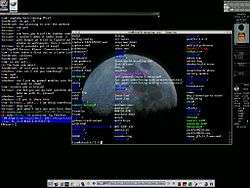Lunar Linux
|
| |
 | |
| Developer | Foo-Projects.org |
|---|---|
| OS family | Unix-like |
| Working state | Current |
| Source model | Open source |
| Initial release | March 2002 (age 15) |
| Latest release | Rolling release 1.7.0 (stable) / 1.7.1 (testing) |
| Available in | English |
| Update method | lin (source code) |
| Package manager | Lunar |
| Platforms | IA-32, x86-64 |
| Kernel type | Monolithic (Linux) |
| License | Various |
| Official website |
www |
Lunar Linux is an operating system maintained around a source-based package management system also called Lunar. The project is a descendant of the Sorcerer Linux distribution.
The installation disk installs a complete bootstrap development system first. After the user tells the Lunar manager which packages will be required, it automatically builds the software by downloading current source code and locally compiling an optimized package. In this way Lunar can be seen as a Linux From Scratch framework.
Currently, Lunar supports the i686 and x86-64 architecture, but has been implemented by users on SPARC.[1] No install support is planned for non-x86 architectures at the moment.
Lunar began as a fork of Sorcerer because of concern over the uncertain future of the distribution. Kyle Sallee, the only maintainer and main developer of Sorcerer was suspected to be mentally ill, showing signs of severe depression and bi-polar disorder. It's believed that because of this erratic behavior is why Sallee decided to re-license all the Sorcerer code into his own custom, non FOSS license called the Sorcerer Public License, as a way to stop people from "stealing" his work after Lunar forked. [2] This move caused the rest of the Sorcerer development team to splinter off and form what is essentially a direct continuation of the last version of Sorcerer licensed under the GNU General Public License, called Source Mage. Comparatively Lunar focuses more on ease of use and user friendliness while Source Mage focuses on advanced customization and system administration.
The last stable release of Lunar was version 1.7.0 back in 2014, although newer testing images exist, and it should be noted that Lunar is a rolling release distribution. [3]
Some Lunar developers also work on the Xfce desktop environment.[4][5]
All Lunar versions are named after real landmarks and areas on the moon.
References
External links
| Wikimedia Commons has media related to Lunar Linux. |